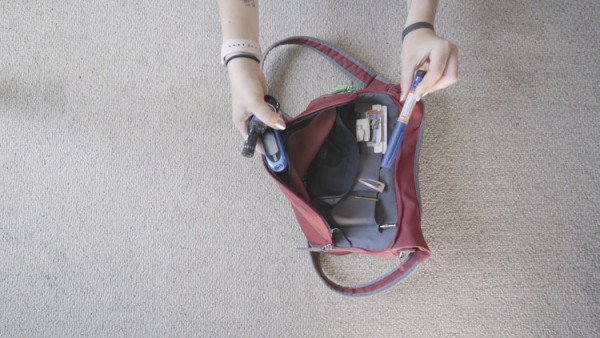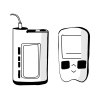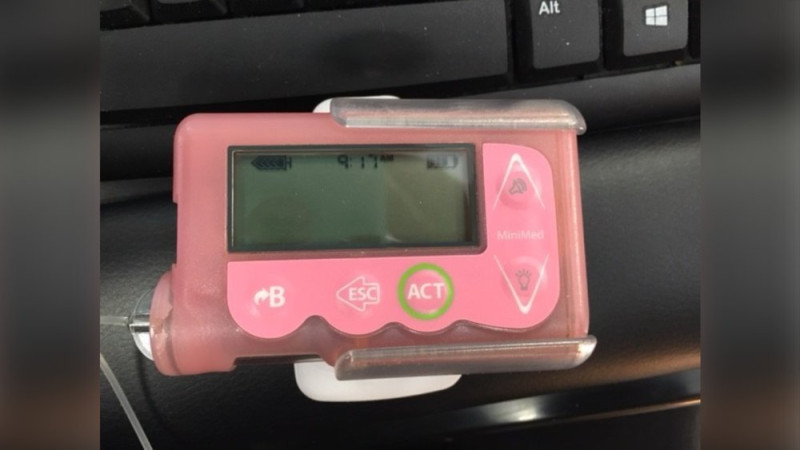Device Combo

Why did you choose these devices?
My numbers were fairly good, but there were some highs overnight and then lows. There were things that I didn't have control over when I was just on injections. At some point, wearing a pump and having technology on me that feels like this foreign thing that's maybe in the way for dance sometimes, outweighed the blood sugar roller coasters that were happening overnight.
I'm using a Dexcom continuous glucose monitor. I've been using it for a little over a year. I got it because it talks to my watch. As a dance teacher, stopping my teaching to go check my blood sugar was a distraction to me and my students, and it would bounce the flow of things. It's much more convenient to be teaching, take a quick look at my watch, realize I'm fine, or do something about it if I'm not. Also, while taking classes as a student and in rehearsals, I'm rehearsing with my friends. They know that if I go over to my bag to check my blood sugar, it could be because I'm feeling funny, and the whole attention and focus of the rehearsal just shifts. It's nice to get rid of the bouncing of flow in a rehearsal or a class.
I Didn't Decide To Get A Pump Until My Doctor Said To Me, "You Are Giving Yourself The Best Care Possible While On Injections. If You Want Your Numbers To Get Better, The Type Of Technology You're Using Has To Change." That's What Made Me Decide.
It makes me feel better when I'm hiking or sailing or doing things that I don't want to stop doing just to check my blood sugar. Currently I'm using a Medtronic pump that I'm borrowing from a friend, but hopefully in the next week or two, my Tandem pump will come in. I decided to go with Tandem because it works with Dexcom. I didn't like that Medtronic would have made me shift and use their continuous glucose monitor. I like being able to see it on my watch.
I know that Tandem will send software updates as opposed to having the hardware being the thing that needs to update. That's attractive to me. I know that soon they'll have the predictive low suspension and predictive high.
What wisdom would you share with someone who is considering your devices?
Talk to people who are using these technologies. Searching on YouTube has been helpful for me because I hear different people's experiences using these technologies and there are tons of YouTube videos about pros and cons. The only challenge I find with it is that it's very specific to their lives. If I'm watching a 10-year-old boy's video, he's going to have different pros and cons from a 70-year-old woman's video. Those will be different pros and cons from my felt experience.
These devices are expensive, how do you manage the cost?
Well, as a freelance artist, cost is a scary thing. I'm squeezing out every bit of my last year of being on my parents' health insurance, so I am hoarding all the devices I can and all the supplies and insulin that I'm probably not even going to use. I've talked to a lot of other freelance artists about what they do for health insurance. I talked to my doctor about it. I found that the best information was from the diabetes community. In terms of justifying the cost, I think it’s about prioritizing my health, knowing that it's worth it, and investing in myself... which not everyone can do.
Diabetes devices can produce a lot of information and numbers. How do you feel about this? What do you do with all the data?
Getting data every five minutes from a Dexcom is a lot of information, for sure. I'm a doer. I always want to act on information. Relaxing that part of me was a bit of a challenge in the beginning. I think I'm better about it now, but yeah. Trusting that just because there's an up arrow doesn't mean that I'll go to infinity and just because there's a down arrow doesn't mean I'm headed towards zero.

How do you respond to people when they notice or comment on your devices?
A lot of times it's, "What's that thing on your arm?" I say, "continuous glucose monitor." People respond in lots of different ways. Today someone told me that he lost a lot of weight and cured his diabetes and that I have a future and I can do it. I was like "Different. Type 1, but congratulations." I have to decide whether or not I'm going to get pissed off at how someone responds, and I have to be open to different levels of education around it, just like conversations about race and sexuality and gender. I think that everyone is at a different place in that educational journey. It doesn't mean that they hate you or want to offend you, but it could mean that they have more learning that they need to do.
How do you make the devices comfortable on your body?
Wardrobe changes. I need to buy new pants. I want to buy those leggings that have pockets on the side with them for when I'm teaching so I can put my pump in it because some of my pants are too loose and it's heavy.
What helps you trust your devices?
I trust my body, which I know not everyone can. Trusting that my felt experience is still accurate to what the actual number is has been really empowering and helpful. I think as a dancer, I'm really in tune with my body already. Sometimes it's useful and sometimes it's not.
The pump I definitely trust, because I've seen what using it does to my blood sugars and how I don't have these random, crazy spikes or drops as much with the pump because of the small and consistent doses.
More Wisdom

Diabetes is one piece of my life that I now have some control over.
Kelsey


This disease is frustrating as it is, but using a pump/meter helps to simplify just one part of it.
Betsy


I really don't like having to wear two sites, but I love that my pump tailors my basal rate.
Anne




